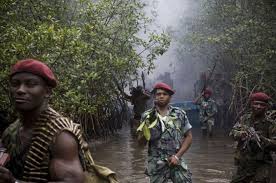Community leaders in Nigeria’s oil-producing Niger Delta are voicing support for a new group of violent militants, saying their demands for a greater share of oil wealth match the aspirations of local people to protest decades of abuse and pollution.
Participants in a stakeholders’ meeting Thursday in Warri accused Nigeria’s government of a heavy-handed military response and warned such a campaign will not stop attacks that have cut oil production by more than 40 percent. The attacks have caused Nigeria to lose its position as the conti nent’s biggest producer to Angola.
A bomb attack Thursday forced U.S.-based oil major Chevron to halt onshore activities in Nigeria at its 160,000-barrel a day Escravos export terminal. It was the third attack this month on Chevron.
In a surprise development, civilian leaders sided with the attackers, calling them “armed agitators” protesting failed government policies.
“Until the issues of resource control that the Niger Delta people have been fighting for since 1960 are addressed … there can be no peace,” said Udengs Eradiri, president of the Ijaw Youth Congress.
Leaders called for “true fiscal federalism” and self-determination.
The Niger Delta Avengers, who have claimed recent attacks, have been calling for secession.
Politicians have been trading accusations about who is sponsoring the Avengers, with southern politicians accusing the party of President Muhammadu Buhari, a northerner, of fomenting a crisis to allow it to militarize the south; Buhari’s supporters say it’s an attempt to embarrass his government by adherents of former President Goodluck Jonathan, a southerner.
The attacks come as Buhari’s year-old government is weighed down by crises: shortages of electricity, fuel and foreign currency and an imminent devaluation of the naira currency caused by plunged oil prices, the ongoing Boko Haram Islamic extremist uprising in the northeast and ethnic unrest in central Nigeria.
AP














